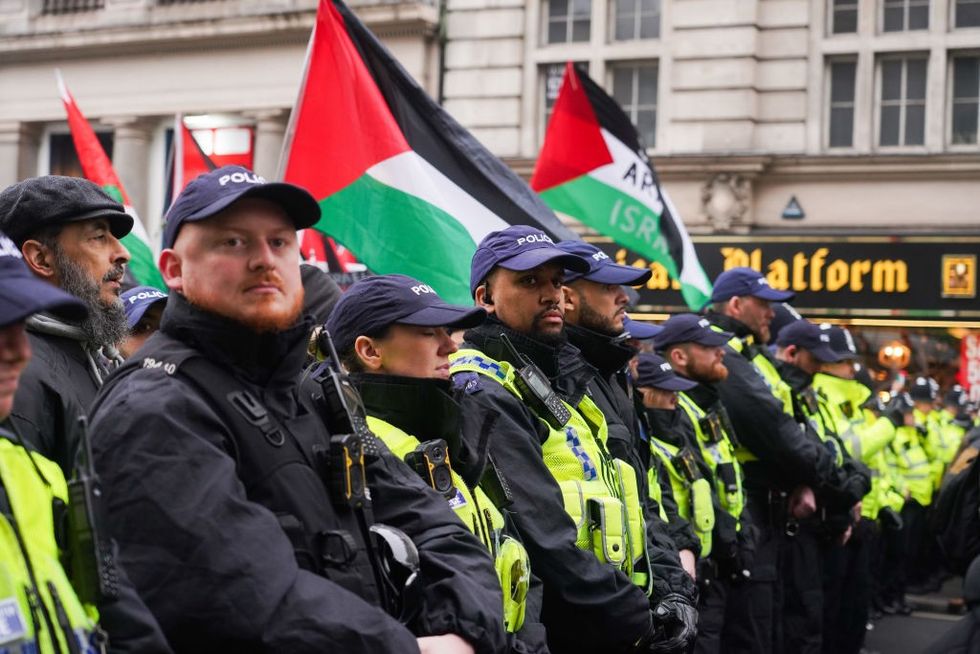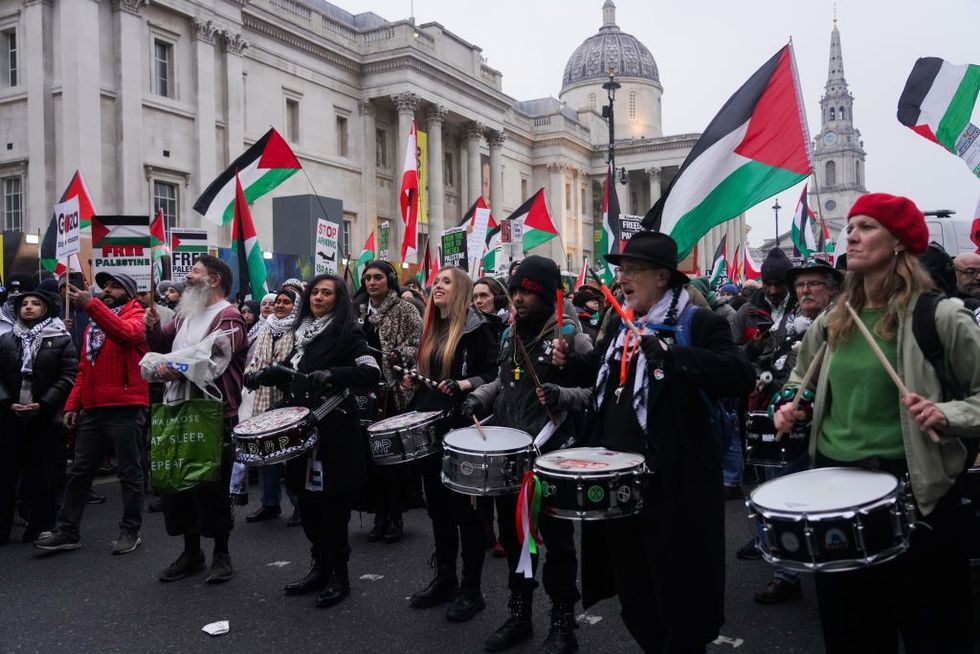More than 40 legal scholars have called for an independent inquiry into the Metropolitan Police’s handling of a pro-Palestine protest in London, describing the force’s actions as “a disproportionate, unwarranted and dangerous assault on the right to assembly and protest”.
The call for action comes after 77 people were arrested during Saturday’s demonstration – which had been redirected from its planned route past BBC headquarters.
The academics, representing over 15 universities, have written to the home secretary expressing “grave concerns” about the policing tactics employed during the protest.
The Met Police had banned protesters from gathering outside the BBC’s London headquarters, citing its proximity to a synagogue and the event taking place on the Sabbath.

The demand follows the arrest of 77 people during Saturday’s demonstration
Getty
The demonstration was changed to a static rally, but Commander Adam Slonecki said protesters made “a deliberate effort” to breach conditions.
“This was a serious escalation in criminality and one which we are taking incredibly seriously,” Commander Slonecki said.
The Palestine Solidarity Campaign disputed the police’s claims, stating the Met had reneged on a previous agreement to allow a march from BBC’s Portland Place to Whitehall.
The legal experts’ letter stated that police conditions imposed on the PSC demonstration were “disproportionate and an abuse of police powers”.
MORE LIKE THIS:
- ‘They always find offence!’ Academics forced to ‘self-censor’ on Hamas and trans debate as students ‘dictate’ lectures
- ‘It undermines the integrity!’ Oxford University accused of accepting ‘disadvantaged’ students to meet diversity target
- Palestine activists march through London despite ceasefire agreement as MORE demands made – 77 arrested
The academics criticised the police’s decision to prevent the demonstration near the BBC, saying authorities failed to provide “any compelling evidence” for the restriction.
The letter suggested police “seemed to be motivated by political considerations that seek to limit the efficacy of the protesters and shield state institutions from criticism”.
The signatories expressed particular concern about the arrest of chief stewards, calling it “a worrying escalation in the assault on the right to protest”.
Among the prominent signatories was Professor Jeff King from University College London, a former legal adviser to the House of Lords select committee on the constitution.
Dr Paul O’Connell, a reader in law at Soas University of London, noted the letter was signed by leading lawyers and academics who have extensive experience in human rights and rule of law.
“It shows, in no uncertain terms, that these experts have the gravest of concerns about the policing of the PSC demonstration – and more generally about the assault on the right to protest in Britain,” O’Connell said.
Twelve people, including the PSC chief steward and director, were charged following the protest.
The majority faced public order offences, with only two individuals charged with different violations.
Former Labour leader Jeremy Corbyn and former shadow chancellor John McDonnell were among those voluntarily interviewed under caution in relation to the march.
Both politicians were “released pending further investigations”, according to authorities.
The Met’s Commander Slonecki said officers would continue reviewing CCTV footage, social media videos and body-worn camera recordings to identify further potential offences.
O’Connell emphasised that freedom to assemble and protest is “the very lifeblood of a democratic society”.

Twelve people, including the PSC chief steward and director, were charged following the protest
Getty
“If people protesting the commission of a genocide in Gaza are not safe to do so, then it bodes ill for individual freedom and democratic life in Britain in the 21st century,” he warned.
The legal expert called on the home secretary, Yvette Cooper, along with London Mayor Sadiq Khan and Attorney General Lord Hermer KC, to ensure that law and police tactics protect protest rights.
He stressed Britain’s obligations under regional and international human rights treaties to facilitate the right to protest.
The letter calls for “a repeal of the raft of anti-protest laws passed in recent years” amid growing concerns about civil liberties.
Legal experts urged Home Secretary Yvette Cooper to ensure Britain upholds its commitments to protect protest rights.
The Met maintained its position that the operation was justified, with officers working “around the clock” to pursue those involved in alleged breaches.
The controversy has sparked wider debate about the balance between public order policing and the fundamental right to protest in Britain.